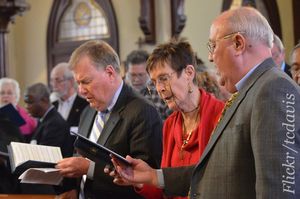A comment of a businessman who had attended a religious conference illustrates, I believe, the confusion many have on the subject of faith and material blessings.
He said: ‘We can’t win. If we work hard and do well, we are greedy. If we don’t work hard and fail, then we are lazy and irresponsible’.
I believe the responsibility of dealing with money correctly is one of the greatest issues the Christian community has today. In a recent Readers Digest poll, 37 per cent stated that money was a primary problem in their marriages.
Here are three money myths in common currency today.
Myth one
This says that, ‘money is the root of all evil’. One often hears people making this statement, but it is false. It is based on a misquotation of 1Timothy 6:10, which actually says, ‘the love of money is the root of all evil’.
It is not money which produces so much wickedness in the world, but the inordinate lust for money and other material things. Money is not bad, in itself. It builds churches and hospitals, feeds the poor, sustains government, and spreads the gospel.
Myth two
This maintains, ‘It is a sin to be rich’. Throughout the Scriptures we are warned about the danger that wealth brings. Jesus stated that it is easier for a camel to go through the eye of a needle than for a rich man to be saved (Luke 18:25).
Prosperity brings the temptations of greed, pride and worldliness. But God’s grace working in someone’s life can help a successful person to overcome these temptations. Success and material prosperity are not sinful. The biblical examples of Abraham, Job and Lydia prove the point.
Myth three
Here is the third: ‘It is a sin to be poor’. One of the latter day heresies being proclaimed by some television preachers is that a life of faith and obedience necessarily and inevitably brings material riches.
In his book The Health and Wealth Gospel (InterVarsity Press) Bruce Barron cites Kenneth Hagin, Kenneth Copeland, Charles Capps, Jerry Savelle and Fred Price as among those who are pandering to greed in America, by encouraging people to use faith as a means of selfish pursuit.
In his book The laws of prosperity Copeland teaches the error that God wills financial prosperity for every one of his children.
Enjoyment
Of these myths, this last is probably the most deadly. But the Bible tells us: ‘Now godliness with contentment is great gain. For we brought nothing into this world, and it is certain we can carry nothing out.
‘And having food and clothing, with these we shall be content … Command those who are rich in this present age not to be haughty, nor to trust in uncertain riches but in the living God, who gives us richly all things to enjoy’ (1 Timothy 6:6-8,17).
John F. Thornbury



















